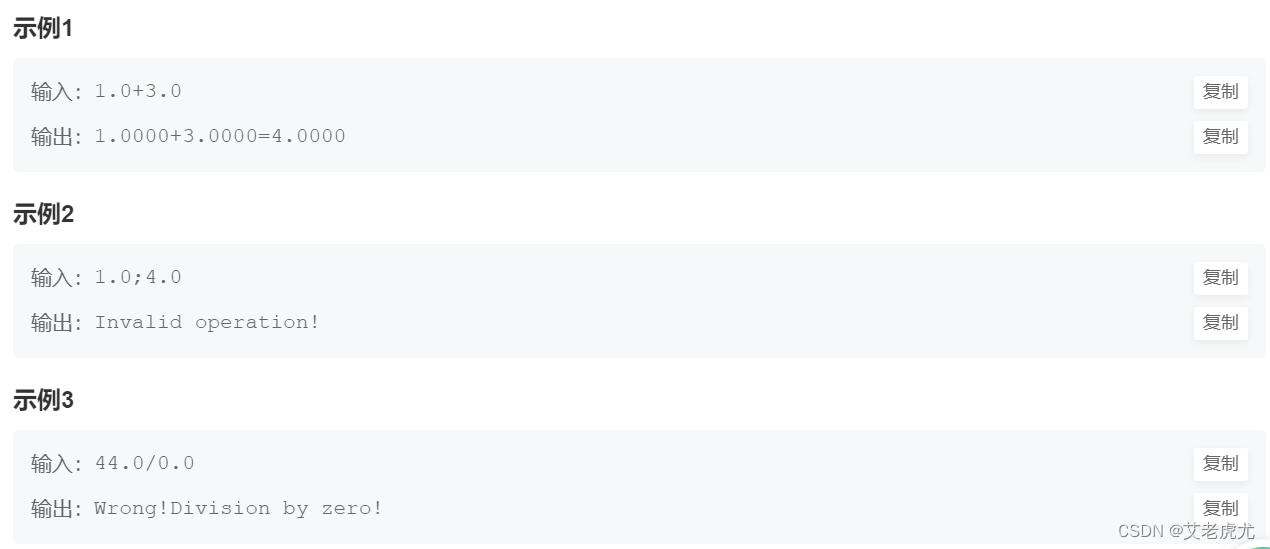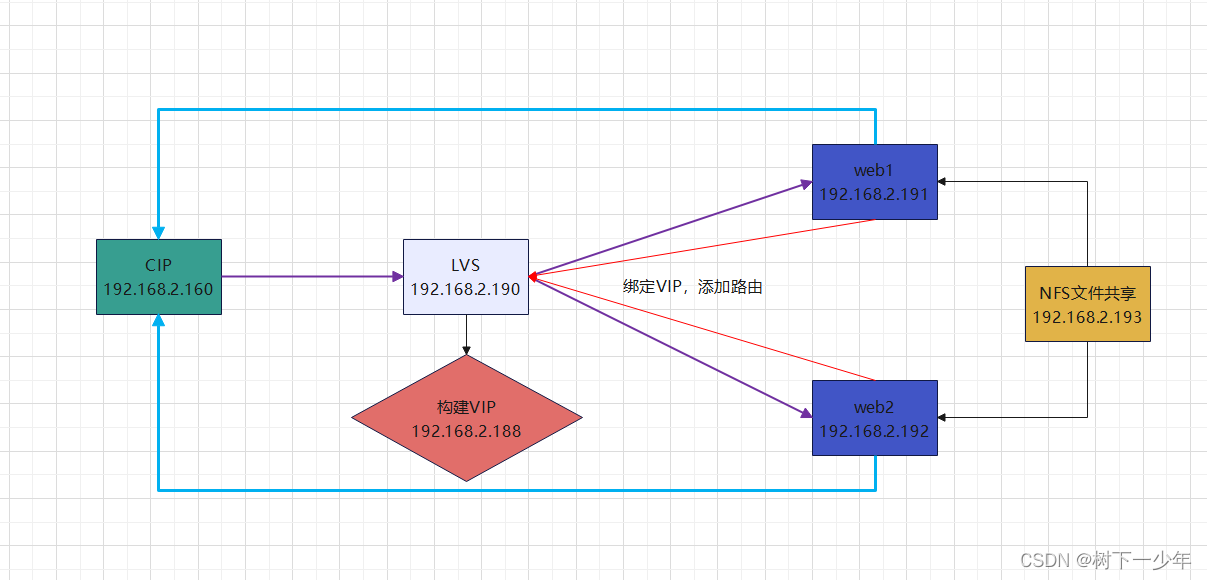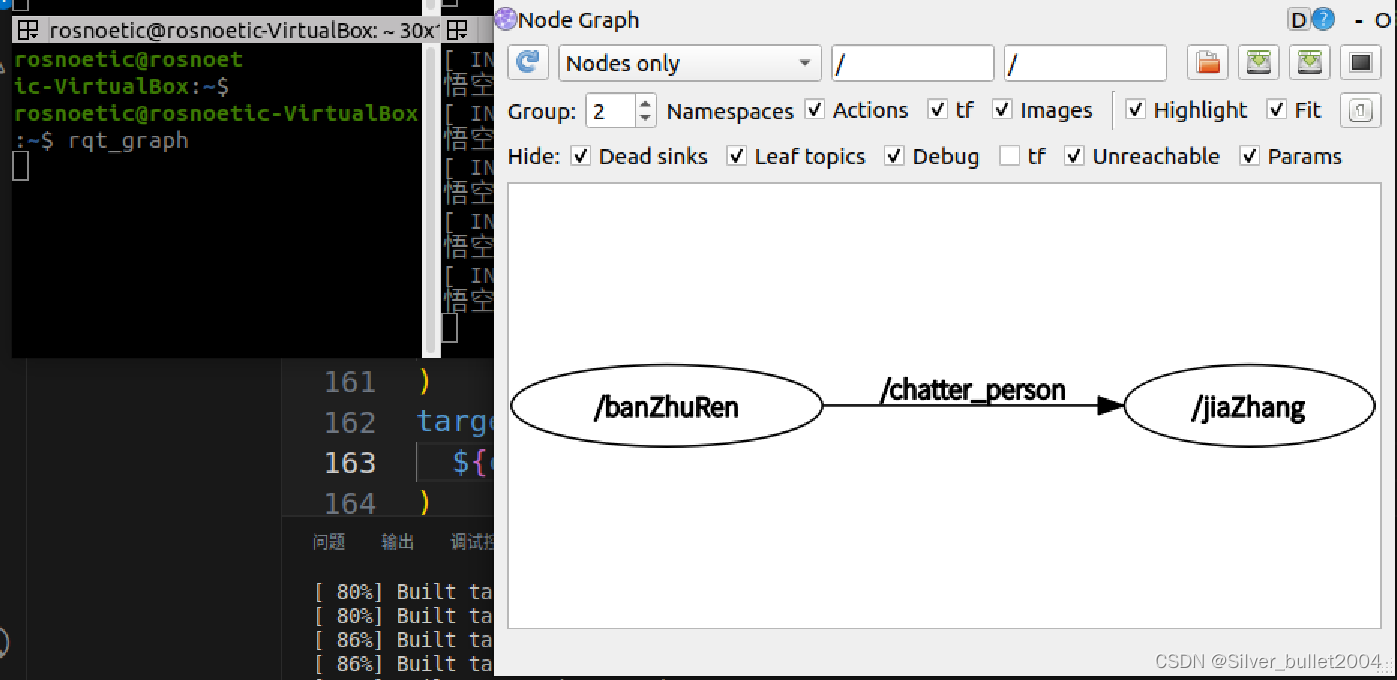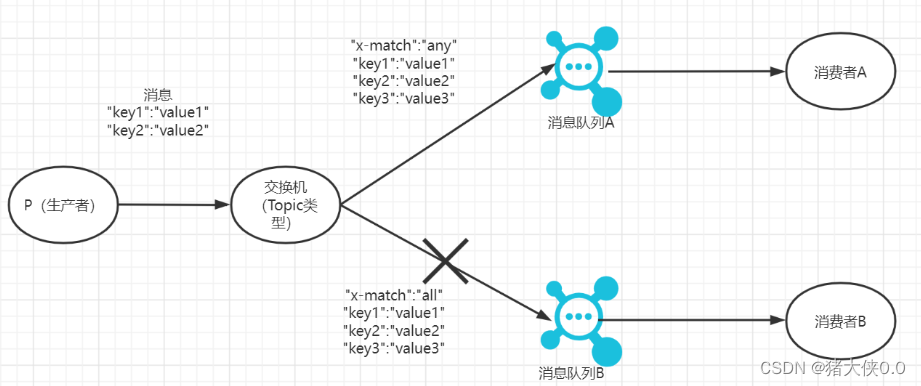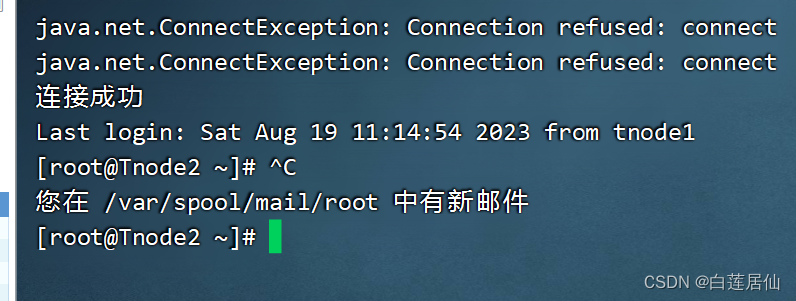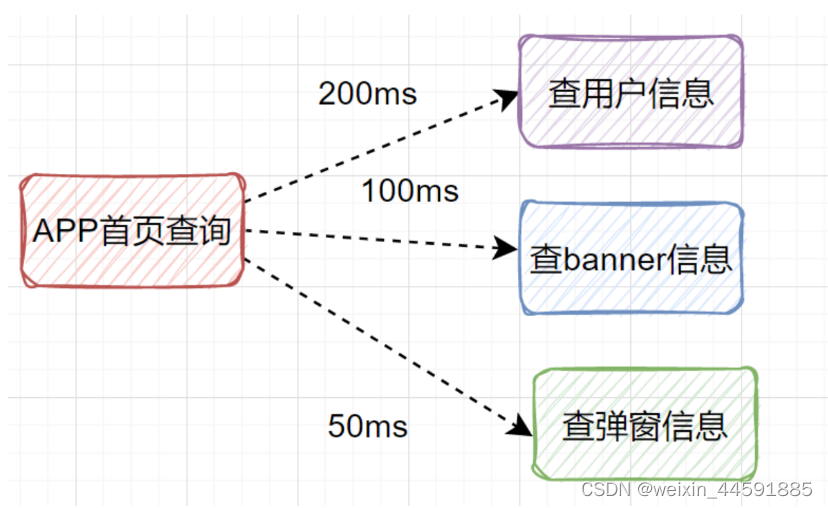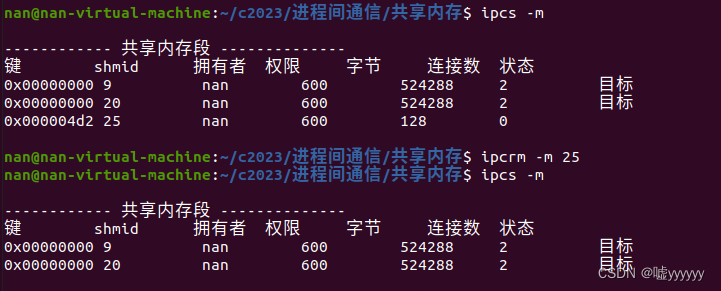在上面一篇的基础上把Nginx源码数组结构也摘录下来,也增加了测试代码,编译运行。
https://blog.csdn.net/katerdaisy/article/details/132358883
《将nginx内存池代码单独编译运行,了解nginx内存池工作原理,附代码》
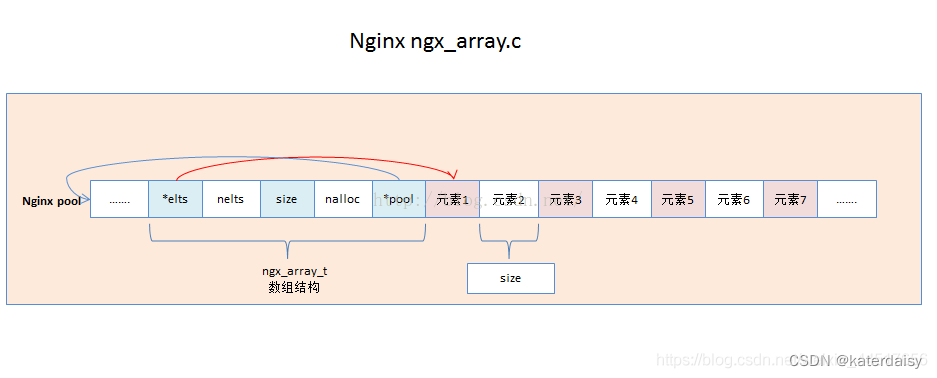
核心代码:
//在内存数组中分三次写入 "hello", "world", "!",然后使用指针加偏移,地址加数据长度两种方式将保存在数组中的文字打印出来
// char mychar[6] = "hello";
// ngx_str_t mydata = {sizeof(mychar),mychar};
ngx_array_t *a = NULL;
a = ngx_array_create(pool, 1, sizeof(ngx_str_t));
ngx_str_t *s = ngx_array_push(a);
s->data = "hello";
s->len = sizeof(s->data);
printf("a->nelts: %ld, a->nalloc:%ld\n",a->nelts,a->nalloc);
printf("ngx_array_push:%s\n",((ngx_str_t *)(a->elts))->data);
printf("ngx_array_push:%s\n",s->data);
ngx_str_t *s1 = ngx_array_push(a);
s1->data = "wrold";
s1->len = sizeof(s1->data);
printf("a->nelts: %ld, a->nalloc:%ld\n",a->nelts,a->nalloc);
printf("ngx_array_push:%s\n",((ngx_str_t *)(a->elts+sizeof(ngx_str_t)))->data);//地址加数据长度
printf("ngx_array_push:%s\n",((ngx_str_t *)(a->elts)+1)->data); //使用指针加偏移
printf("ngx_array_push:%s\n",s1->data);
ngx_str_t *s2 = ngx_array_push(a);
s2->data = "!";
s2->len = sizeof(s2->data);
printf("a->nelts: %ld, a->nalloc:%ld\n",a->nelts,a->nalloc);
printf("ngx_array_push:%s\n",((ngx_str_t *)(a->elts+sizeof(ngx_str_t)*(a->nelts-1)))->data);//地址加数据长度
printf("ngx_array_push:%s\n",((ngx_str_t *)(a->elts)+a->nelts-1)->data); //使用指针加偏移
printf("ngx_array_push:%s\n",s2->data);
结果:
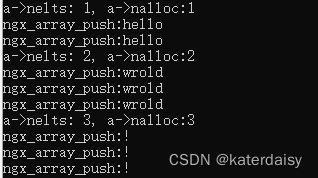
完整代码:
//-------------------------------------------------------------------------------------------
//下面是一些头文件和宏定义,从nginx的源码中摘录过来
#include </usr/include/stdint.h>
#include <sys/types.h>
#include <sys/time.h>
#include <unistd.h>
#include <stdarg.h>
#include <stddef.h> /* offsetof() /
#include <stdio.h>
#include <stdlib.h>
#include <ctype.h>
#include <errno.h>
#include <string.h>
#include <signal.h>
#include <pwd.h>
#include <grp.h>
#include <dirent.h>
#include <glob.h>
#include <sys/vfs.h> / statfs() */
#include <sys/uio.h>
#include <sys/stat.h>
#include <fcntl.h>
#include <sys/wait.h>
#include <sys/mman.h>
#include <sys/resource.h>
#include <sched.h>
#include <sys/socket.h>
#include <netinet/in.h>
#include <netinet/tcp.h> /* TCP_NODELAY, TCP_CORK */
#include <arpa/inet.h>
#include <netdb.h>
#include <sys/un.h>
#include <time.h> /* tzset() /
#include <malloc.h> / memalign() /
#include <limits.h> / IOV_MAX /
#include <sys/ioctl.h>
#include <crypt.h>
#include <sys/utsname.h> / uname() */
#include <dlfcn.h>
#ifndef ngx_inline
#define ngx_inline inline
#endif
typedef int ngx_fd_t;
typedef intptr_t ngx_int_t;
typedef uintptr_t ngx_uint_t;
typedef intptr_t ngx_flag_t;
typedef struct ngx_module_s ngx_module_t;
typedef struct ngx_conf_s ngx_conf_t;
typedef struct ngx_cycle_s ngx_cycle_t;
typedef struct ngx_pool_s ngx_pool_t;
typedef struct ngx_chain_s ngx_chain_t;
typedef struct ngx_log_s ngx_log_t;
typedef struct ngx_open_file_s ngx_open_file_t;
typedef struct ngx_command_s ngx_command_t;
typedef struct ngx_file_s ngx_file_t;
typedef struct ngx_event_s ngx_event_t;
typedef struct ngx_event_aio_s ngx_event_aio_t;
typedef struct ngx_connection_s ngx_connection_t;
ngx_uint_t ngx_pagesize;
ngx_uint_t ngx_pagesize_shift;
ngx_uint_t ngx_cacheline_size;
// #define NGX_LOG_STDERR 0
// #define NGX_LOG_EMERG 1
// #define NGX_LOG_ALERT 2
// #define NGX_LOG_CRIT 3
// #define NGX_LOG_ERR 4
// #define NGX_LOG_WARN 5
// #define NGX_LOG_NOTICE 6
// #define NGX_LOG_INFO 7
// #define NGX_LOG_DEBUG 8
// #define NGX_LOG_DEBUG_CORE 0x010
// #define NGX_LOG_DEBUG_ALLOC 0x020
// #define NGX_LOG_DEBUG_MUTEX 0x040
// #define NGX_LOG_DEBUG_EVENT 0x080
// #define NGX_LOG_DEBUG_HTTP 0x100
// #define NGX_LOG_DEBUG_MAIL 0x200
// #define NGX_LOG_DEBUG_STREAM 0x400
/*
- do not forget to update debug_levels[] in src/core/ngx_log.c
- after the adding a new debug level
*/
#define NGX_LOG_DEBUG_FIRST NGX_LOG_DEBUG_CORE
#define NGX_LOG_DEBUG_LAST NGX_LOG_DEBUG_STREAM
#define NGX_LOG_DEBUG_CONNECTION 0x80000000
#define NGX_LOG_DEBUG_ALL 0x7ffffff0
#ifndef NGX_PALLOC_H_INCLUDED
#define NGX_PALLOC_H_INCLUDED
#ifndef NGX_ALIGNMENT
#define NGX_ALIGNMENT sizeof(unsigned long) /* platform word */
#endif
#define NGX_OK 0
#define NGX_ERROR -1
#define NGX_AGAIN -2
#define NGX_BUSY -3
#define NGX_DONE -4
#define NGX_DECLINED -5
#define NGX_ABORT -6
#define NGX_INVALID_FILE -1
#define NGX_FILE_ERROR -1
#define ngx_errno errno
#define ngx_close_file close
#define ngx_close_file_n “close()”
typedef int ngx_err_t;
#define NGX_ENOENT ENOENT
#define ngx_delete_file_n “unlink()”
/*
- NGX_MAX_ALLOC_FROM_POOL should be (ngx_pagesize - 1), i.e. 4095 on x86.
- On Windows NT it decreases a number of locked pages in a kernel.
*/
#define NGX_MAX_ALLOC_FROM_POOL (ngx_pagesize - 1)
#define NGX_DEFAULT_POOL_SIZE (16 * 1024)
#define NGX_POOL_ALIGNMENT 16
#define NGX_MIN_POOL_SIZE
ngx_align((sizeof(ngx_pool_t) + 2 * sizeof(ngx_pool_large_t)),
NGX_POOL_ALIGNMENT)
typedef void (*ngx_pool_cleanup_pt)(void *data);
typedef struct ngx_pool_cleanup_s ngx_pool_cleanup_t;
struct ngx_pool_cleanup_s {
ngx_pool_cleanup_pt handler;
void *data;
ngx_pool_cleanup_t *next;
};
typedef struct ngx_pool_large_s ngx_pool_large_t;
struct ngx_pool_large_s {
ngx_pool_large_t *next;
void *alloc;
};
typedef struct {
u_char *last;
u_char *end;
ngx_pool_t *next;
ngx_uint_t failed;
} ngx_pool_data_t;
struct ngx_pool_s {
ngx_pool_data_t d;
size_t max;
ngx_pool_t *current;
ngx_chain_t *chain;
ngx_pool_large_t *large;
ngx_pool_cleanup_t *cleanup;
ngx_log_t *log;
};
typedef struct {
ngx_fd_t fd;
u_char *name;
ngx_log_t *log;
} ngx_pool_cleanup_file_t;
void *ngx_alloc(size_t size, ngx_log_t *log);
void *ngx_calloc(size_t size, ngx_log_t *log);
ngx_pool_t *ngx_create_pool(size_t size, ngx_log_t *log);
void ngx_destroy_pool(ngx_pool_t *pool);
void ngx_reset_pool(ngx_pool_t *pool);
void *ngx_palloc(ngx_pool_t *pool, size_t size);
void *ngx_pnalloc(ngx_pool_t *pool, size_t size);
void *ngx_pcalloc(ngx_pool_t *pool, size_t size);
void *ngx_pmemalign(ngx_pool_t *pool, size_t size, size_t alignment);
ngx_int_t ngx_pfree(ngx_pool_t *pool, void *p);
ngx_pool_cleanup_t *ngx_pool_cleanup_add(ngx_pool_t *p, size_t size);
void ngx_pool_run_cleanup_file(ngx_pool_t *p, ngx_fd_t fd);
void ngx_pool_cleanup_file(void *data);
void ngx_pool_delete_file(void *data);
#endif /* NGX_PALLOC_H_INCLUDED */
ngx_uint_t ngx_pagesize;
ngx_uint_t ngx_pagesize_shift;
ngx_uint_t ngx_cacheline_size;
#define ngx_free free
#define ngx_memzero(buf, n) (void) memset(buf, 0, n)
#define ngx_memset(buf, c, n) (void) memset(buf, c, n)
#define ngx_align_ptr(p, a)
(u_char *) (((uintptr_t) § + ((uintptr_t) a - 1)) & ~((uintptr_t) a - 1))
#define ngx_delete_file(name) unlink((const char *) name)
#define ngx_delete_file_n “unlink()”
void *
ngx_alloc(size_t size, ngx_log_t *log)
{
void *p;
p = malloc(size);
if (p == NULL) {
printf("malloc(%lu) failed\n", size);
}
printf("malloc: %p:%lu\n", p, size);
return p;
}
void *
ngx_calloc(size_t size, ngx_log_t *log)
{
void *p;
p = ngx_alloc(size, log);
if (p) {
ngx_memzero(p, size);
}
return p;
}
//#define NGX_HAVE_POSIX_MEMALIGN 1
#define NGX_HAVE_MEMALIGN 1
#if (NGX_HAVE_POSIX_MEMALIGN)
void *
ngx_memalign(size_t alignment, size_t size, ngx_log_t *log)
{
void *p;
int err;
err = posix_memalign(&p, alignment, size);
if (err) {
printf("posix_memalign(%lu, %lu) failed\n", alignment, size);
p = NULL;
}
printf("posix_memalign: %p:%lu @%lu\n", p, size, alignment);
return p;
}
#elif (NGX_HAVE_MEMALIGN)
void *
ngx_memalign(size_t alignment, size_t size, ngx_log_t *log)
{
void *p;
p = memalign(alignment, size);
if (p == NULL) {
printf("memalign(%lu, %lu) failed\n", alignment, size);
}
printf("memalign: %p:%lu @%lu\n", p, size, alignment);
return p;
}
#endif
//-------------------------------------------------------------------------------------------
//下面是从ngx_pcallo.c复制过来的内存池核心代码
static ngx_inline void *ngx_palloc_small(ngx_pool_t *pool, size_t size,
ngx_uint_t align);
static void *ngx_palloc_block(ngx_pool_t *pool, size_t size);
static void *ngx_palloc_large(ngx_pool_t *pool, size_t size);
ngx_pool_t *
ngx_create_pool(size_t size, ngx_log_t *log)
{
ngx_pool_t *p;
p = ngx_memalign(NGX_POOL_ALIGNMENT, size, log);
if (p == NULL) {
return NULL;
}
p->d.last = (u_char *) p + sizeof(ngx_pool_t);
p->d.end = (u_char *) p + size;
p->d.next = NULL;
p->d.failed = 0;
size = size - sizeof(ngx_pool_t);
p->max = (size < NGX_MAX_ALLOC_FROM_POOL) ? size : NGX_MAX_ALLOC_FROM_POOL;
p->current = p;
p->chain = NULL;
p->large = NULL;
p->cleanup = NULL;
p->log = log;
return p;
}
void
ngx_destroy_pool(ngx_pool_t *pool)
{
ngx_pool_t *p, *n;
ngx_pool_large_t *l;
ngx_pool_cleanup_t *c;
for (c = pool->cleanup; c; c = c->next) {
if (c->handler) {
printf("run cleanup: %p\n", c);
c->handler(c->data);
}
}
#if (NGX_DEBUG)
/*
* we could allocate the pool->log from this pool
* so we cannot use this log while free()ing the pool
*/
for (l = pool->large; l; l = l->next) {
printf("free: %p\n", l->alloc);
}
for (p = pool, n = pool->d.next; /* void */; p = n, n = n->d.next) {
printf("free: %p, unused: %lu\n", p, p->d.end - p->d.last);
if (n == NULL) {
break;
}
}
#endif
for (l = pool->large; l; l = l->next) {
if (l->alloc) {
ngx_free(l->alloc);
}
}
for (p = pool, n = pool->d.next; /* void */; p = n, n = n->d.next) {
ngx_free(p);
if (n == NULL) {
break;
}
}
}
void
ngx_reset_pool(ngx_pool_t *pool)
{
ngx_pool_t *p;
ngx_pool_large_t *l;
for (l = pool->large; l; l = l->next) {
if (l->alloc) {
ngx_free(l->alloc);
}
}
for (p = pool; p; p = p->d.next) {
p->d.last = (u_char *) p + sizeof(ngx_pool_t);
p->d.failed = 0;
}
pool->current = pool;
pool->chain = NULL;
pool->large = NULL;
}
void *
ngx_palloc(ngx_pool_t *pool, size_t size)
{
#if !(NGX_DEBUG_PALLOC)
if (size <= pool->max) {
return ngx_palloc_small(pool, size, 1);
}
#endif
return ngx_palloc_large(pool, size);
}
void *
ngx_pnalloc(ngx_pool_t *pool, size_t size)
{
#if !(NGX_DEBUG_PALLOC)
if (size <= pool->max) {
return ngx_palloc_small(pool, size, 0);
}
#endif
return ngx_palloc_large(pool, size);
}
static ngx_inline void *
ngx_palloc_small(ngx_pool_t *pool, size_t size, ngx_uint_t align)
{
u_char *m;
ngx_pool_t *p;
p = pool->current;
do {
m = p->d.last;
if (align) {
m = ngx_align_ptr(m, NGX_ALIGNMENT);
}
if ((size_t) (p->d.end - m) >= size) {
p->d.last = m + size;
return m;
}
p = p->d.next;
} while (p);
return ngx_palloc_block(pool, size);
}
static void *
ngx_palloc_block(ngx_pool_t *pool, size_t size)
{
u_char *m;
size_t psize;
ngx_pool_t *p, *new;
psize = (size_t) (pool->d.end - (u_char *) pool);
m = ngx_memalign(NGX_POOL_ALIGNMENT, psize, pool->log);
if (m == NULL) {
return NULL;
}
new = (ngx_pool_t *) m;
new->d.end = m + psize;
new->d.next = NULL;
new->d.failed = 0;
m += sizeof(ngx_pool_data_t);
m = ngx_align_ptr(m, NGX_ALIGNMENT);
new->d.last = m + size;
for (p = pool->current; p->d.next; p = p->d.next) {
if (p->d.failed++ > 4) {
pool->current = p->d.next;
}
}
p->d.next = new;
return m;
}
static void *
ngx_palloc_large(ngx_pool_t *pool, size_t size)
{
void *p;
ngx_uint_t n;
ngx_pool_large_t *large;
p = ngx_alloc(size, pool->log);
if (p == NULL) {
return NULL;
}
n = 0;
for (large = pool->large; large; large = large->next) {
if (large->alloc == NULL) {
large->alloc = p;
return p;
}
if (n++ > 3) {
break;
}
}
large = ngx_palloc_small(pool, sizeof(ngx_pool_large_t), 1);
if (large == NULL) {
ngx_free(p);
return NULL;
}
large->alloc = p;
large->next = pool->large;
pool->large = large;
return p;
}
void *
ngx_pmemalign(ngx_pool_t *pool, size_t size, size_t alignment)
{
void *p;
ngx_pool_large_t *large;
p = ngx_memalign(alignment, size, pool->log);
if (p == NULL) {
return NULL;
}
large = ngx_palloc_small(pool, sizeof(ngx_pool_large_t), 1);
if (large == NULL) {
ngx_free(p);
return NULL;
}
large->alloc = p;
large->next = pool->large;
pool->large = large;
return p;
}
ngx_int_t
ngx_pfree(ngx_pool_t *pool, void *p)
{
ngx_pool_large_t *l;
for (l = pool->large; l; l = l->next) {
if (p == l->alloc) {
printf("free: %p\n", l->alloc);
ngx_free(l->alloc);
l->alloc = NULL;
return NGX_OK;
}
}
return NGX_DECLINED;
}
void *
ngx_pcalloc(ngx_pool_t *pool, size_t size)
{
void *p;
p = ngx_palloc(pool, size);
if (p) {
ngx_memzero(p, size);
}
return p;
}
ngx_pool_cleanup_t *
ngx_pool_cleanup_add(ngx_pool_t *p, size_t size)
{
ngx_pool_cleanup_t *c;
c = ngx_palloc(p, sizeof(ngx_pool_cleanup_t));
if (c == NULL) {
return NULL;
}
if (size) {
c->data = ngx_palloc(p, size);
if (c->data == NULL) {
return NULL;
}
} else {
c->data = NULL;
}
c->handler = NULL;
c->next = p->cleanup;
p->cleanup = c;
printf("add cleanup: %p\n", c);
return c;
}
void
ngx_pool_run_cleanup_file(ngx_pool_t *p, ngx_fd_t fd)
{
ngx_pool_cleanup_t *c;
ngx_pool_cleanup_file_t *cf;
for (c = p->cleanup; c; c = c->next) {
if (c->handler == ngx_pool_cleanup_file) {
cf = c->data;
if (cf->fd == fd) {
c->handler(cf);
c->handler = NULL;
return;
}
}
}
}
void
ngx_pool_cleanup_file(void *data)
{
ngx_pool_cleanup_file_t *c = data;
printf("file cleanup: fd:%d\n",
c->fd);
if (ngx_close_file(c->fd) == NGX_FILE_ERROR) {
printf(" \"%s\" failed\n", c->name);
}
}
void
ngx_pool_delete_file(void *data)
{
ngx_pool_cleanup_file_t *c = data;
ngx_err_t err;
printf("file cleanup: fd:%d %s\n",
c->fd, c->name);
if (ngx_delete_file(c->name) == NGX_FILE_ERROR) {
err = ngx_errno;
if (err != NGX_ENOENT) {
printf(" \"%s\" failed\n", c->name);
}
}
if (ngx_close_file(c->fd) == NGX_FILE_ERROR) {
printf(" \"%s\" failed\n", c->name);
}
}
#if 0
static void *
ngx_get_cached_block(size_t size)
{
void *p;
ngx_cached_block_slot_t *slot;
if (ngx_cycle->cache == NULL) {
return NULL;
}
slot = &ngx_cycle->cache[(size + ngx_pagesize - 1) / ngx_pagesize];
slot->tries++;
if (slot->number) {
p = slot->block;
slot->block = slot->block->next;
slot->number--;
return p;
}
return NULL;
}
#endif
//-----------------------------------------------------------------------------------------
//array
typedef struct {
size_t len;
u_char *data;
} ngx_str_t;
#define ngx_memcpy(dst, src, n) (void) memcpy(dst, src, n)
#ifndef NGX_ARRAY_H_INCLUDED
#define NGX_ARRAY_H_INCLUDED
typedef struct {
void *elts;
ngx_uint_t nelts;
size_t size;
ngx_uint_t nalloc;
ngx_pool_t *pool;
} ngx_array_t;
ngx_array_t *ngx_array_create(ngx_pool_t *p, ngx_uint_t n, size_t size);
void ngx_array_destroy(ngx_array_t *a);
void *ngx_array_push(ngx_array_t *a);
void *ngx_array_push_n(ngx_array_t *a, ngx_uint_t n);
static ngx_inline ngx_int_t
ngx_array_init(ngx_array_t *array, ngx_pool_t pool, ngx_uint_t n, size_t size)
{
/
* set “array->nelts” before “array->elts”, otherwise MSVC thinks
* that “array->nelts” may be used without having been initialized
*/
array->nelts = 0;
array->size = size;
array->nalloc = n;
array->pool = pool;
array->elts = ngx_palloc(pool, n * size);
if (array->elts == NULL) {
return NGX_ERROR;
}
return NGX_OK;
}
#endif /* NGX_ARRAY_H_INCLUDED */
ngx_array_t *
ngx_array_create(ngx_pool_t *p, ngx_uint_t n, size_t size)
{
ngx_array_t *a;
a = ngx_palloc(p, sizeof(ngx_array_t));
if (a == NULL) {
return NULL;
}
if (ngx_array_init(a, p, n, size) != NGX_OK) {
return NULL;
}
return a;
}
void
ngx_array_destroy(ngx_array_t *a)
{
ngx_pool_t *p;
p = a->pool;
if ((u_char *) a->elts + a->size * a->nalloc == p->d.last) {
p->d.last -= a->size * a->nalloc;
}
if ((u_char *) a + sizeof(ngx_array_t) == p->d.last) {
p->d.last = (u_char *) a;
}
}
void *
ngx_array_push(ngx_array_t *a)
{
void *elt, *new;
size_t size;
ngx_pool_t *p;
if (a->nelts == a->nalloc) {
/* the array is full */
size = a->size * a->nalloc;
p = a->pool;
if ((u_char *) a->elts + size == p->d.last
&& p->d.last + a->size <= p->d.end)
{
/*
* the array allocation is the last in the pool
* and there is space for new allocation
*/
p->d.last += a->size;
a->nalloc++;
} else {
/* allocate a new array */
new = ngx_palloc(p, 2 * size);
if (new == NULL) {
return NULL;
}
ngx_memcpy(new, a->elts, size);
a->elts = new;
a->nalloc *= 2;
}
}
elt = (u_char *) a->elts + a->size * a->nelts;
a->nelts++;
return elt;
}
void *
ngx_array_push_n(ngx_array_t *a, ngx_uint_t n)
{
void *elt, *new;
size_t size;
ngx_uint_t nalloc;
ngx_pool_t *p;
size = n * a->size;
if (a->nelts + n > a->nalloc) {
/* the array is full */
p = a->pool;
if ((u_char *) a->elts + a->size * a->nalloc == p->d.last
&& p->d.last + size <= p->d.end)
{
/*
* the array allocation is the last in the pool
* and there is space for new allocation
*/
p->d.last += size;
a->nalloc += n;
} else {
/* allocate a new array */
nalloc = 2 * ((n >= a->nalloc) ? n : a->nalloc);
new = ngx_palloc(p, nalloc * a->size);
if (new == NULL) {
return NULL;
}
ngx_memcpy(new, a->elts, a->nelts * a->size);
a->elts = new;
a->nalloc = nalloc;
}
}
elt = (u_char *) a->elts + a->size * a->nelts;
a->nelts += n;
return elt;
}
//-------------------------------------------------------------------------------------------
//下面是Main函数和内存池打印代码
void print_pool(ngx_pool_t *pool)
{
if (pool->large != NULL)
{
printf("has large memory\n");
for(ngx_pool_large_t* i = pool->large; i!=NULL; i = i->next)
{
printf("\t\tlarge next=0x%x\n", i->next);
printf("\t\tlarge alloc=0x%x\n", i->alloc);
}
}
int i=1;
while(pool)
{
printf("pool=0x%x,index:%d\n", pool, i++);
printf("\t\tlast=0x%x\n", (pool->d).last);
printf("\t\tend=0x%x\n",(pool->d).end);
printf("\t\tnext=0x%x\n",(pool->d).next);
printf("\t\tfailed=%d\n",pool->d.failed);
printf("\t\tmax=%d\n",pool->max);
printf("\t\tcurrent=0x%x\n",pool->current);
printf("\t\tchain=0x%x\n",pool->chain);
printf("\t\tlarge=0x%x\n",pool->large);
printf("\t\tcleanup=0x%x\n",pool->cleanup);
printf("\t\tlog=0x%x\n",pool->log);
printf("\t\tavailable pool memory=%d\n", pool->d.end-pool->d.last);
printf("\n");
pool=pool->d.next;
}
}
void print_array(int *a,int size)
{
for(int i=0; i<size; i++)
{
printf("%d,",a[i]);
}
printf("\n");
}
int main()
{
ngx_pool_t *pool;
int array_size = 1;
int array_size_large = 1024;
int page_size = getpagesize();//获得一页的大小
printf("page_size:%d\n", page_size);
printf("----------------------------\n");
printf("create a new pool\n");
pool = ngx_create_pool(1024, NULL);//创建一个大小为1024的内存池
print_pool(pool);
printf("----------------------------\n");
printf("alloc block 1 from the pool:\n");
int *a1 = ngx_palloc(pool, sizeof(int) * array_size);//分配第一块内存 用于创建数组
for (int i=0; i< array_size; i++)
{
a1[i] = i+1;
}
print_pool(pool);
printf("----------------------------\n");
printf("alloc block 2 from the pool:\n");
int *a2 = ngx_palloc(pool, sizeof(int) * array_size);//分配第二块内存 用于创建数组,这个时候会创建第二个内存池节点
for (int i=0; i< array_size; i++)
{
a2[i] = 12345678;
}
print_pool(pool);
printf("----------------------------\n");
printf("alloc large memory:\n");
printf("\t\tlarge next before=0x%x\n", pool->current->d.last);
int * a3 = ngx_palloc(pool, sizeof(int) * array_size_large);//由于大小超过了max的值 ngx_palloc中会调用ngx_palloc_large分配大块内存
printf("\t\tlarge next after=0x%x\n", pool->large);
for (int i=0; i< array_size_large; i++)
{
a3[i] = i+1;
}
print_array(a1,array_size);//分配的第一块内存块首地址
print_array(a2,array_size);//分配的第二块内存块首地址
// print_array(a3,array_size_large);//分配的大内存块首地址
//在内存数组中分三次写入 “hello”, “world”, “!”,然后使用指针加偏移,地址加数据长度两种方式将保存在数组中的文字打印出来
// char mychar[6] = “hello”;
// ngx_str_t mydata = {sizeof(mychar),mychar};
ngx_array_t *a = NULL;
a = ngx_array_create(pool, 1, sizeof(ngx_str_t));
ngx_str_t *s = ngx_array_push(a);
s->data = "hello";
s->len = sizeof(s->data);
printf("a->nelts: %ld, a->nalloc:%ld\n",a->nelts,a->nalloc);
printf("ngx_array_push:%s\n",((ngx_str_t *)(a->elts))->data);
printf("ngx_array_push:%s\n",s->data);
ngx_str_t *s1 = ngx_array_push(a);
s1->data = "wrold";
s1->len = sizeof(s1->data);
printf("a->nelts: %ld, a->nalloc:%ld\n",a->nelts,a->nalloc);
printf("ngx_array_push:%s\n",((ngx_str_t *)(a->elts+sizeof(ngx_str_t)))->data);//地址加数据长度
printf("ngx_array_push:%s\n",((ngx_str_t *)(a->elts)+1)->data); //使用指针加偏移
printf("ngx_array_push:%s\n",s1->data);
ngx_str_t *s2 = ngx_array_push(a);
s2->data = "!";
s2->len = sizeof(s2->data);
printf("a->nelts: %ld, a->nalloc:%ld\n",a->nelts,a->nalloc);
printf("ngx_array_push:%s\n",((ngx_str_t *)(a->elts+sizeof(ngx_str_t)*(a->nelts-1)))->data);//地址加数据长度
printf("ngx_array_push:%s\n",((ngx_str_t *)(a->elts)+a->nelts-1)->data); //使用指针加偏移
printf("ngx_array_push:%s\n",s2->data);
print_pool(pool);
ngx_destroy_pool(pool);
return 0;
}
